Magic Bullet Mini Juicer Review: cheap, cheerful juicing
The Magic Bullet Mini Juicer is the best juicer you can get for under $100, but it won't compete with the very best models
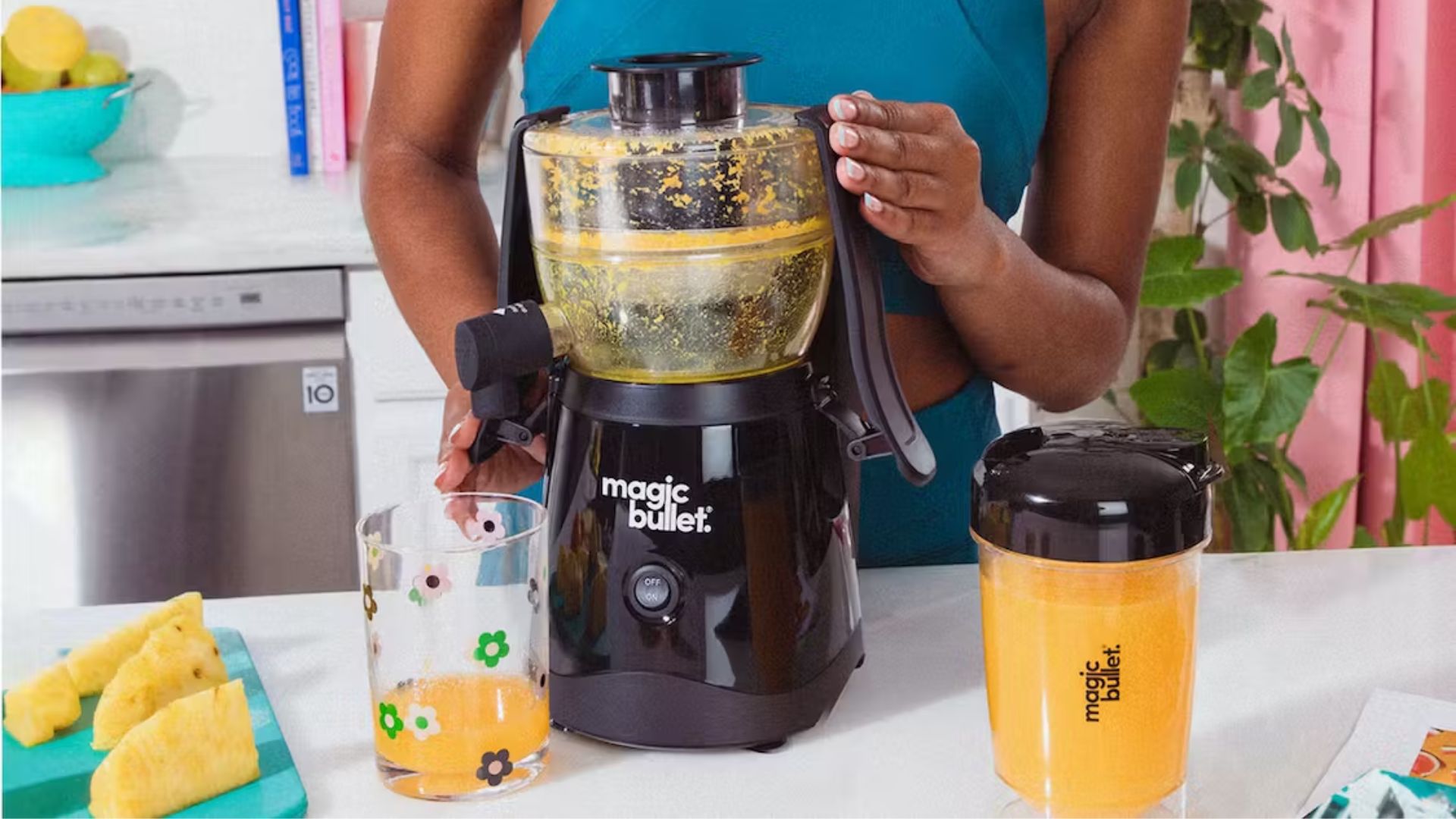
An amazing juicer for under $100, but a poor one when you compare it to the competition.
-
+
Budget friendly
-
+
Compact
-
+
Great taste
-
+
Dishwasher safe
- +
-
-
Struggles with leaves
-
-
Noisy
-
-
Foamy, thick juice
-
-
Messy
You can trust Homes & Gardens.

Something was bugging me when I was taking a look at our our guide to the best juicers. They're all good, but most of them have wince-inducing price tags. Some of our favorite juicers cost upwards of $400, which is a huge outlay for a simple glass of orange juice.
With that in mind, I got my hands on a little budget juicer that at the time of writing retails for just $60. I wanted to see if the Magic Bullet Mini Juicer could stand up to the big names; if it beat them, I could save you hundreds of dollars.
Unfortunately, this simply isn't as good as expensive juicers. If you're really tight on money and are desperate for fresh juice, this is a good pick. It will power through soft fruits in seconds - I made fantastic orange and berry juice. However, it can't take on tough skins or leafy greens. The juice it makes tastes great, but it's more like a smoothie than the clean, refreshing taste of the best juicers.
Specifications
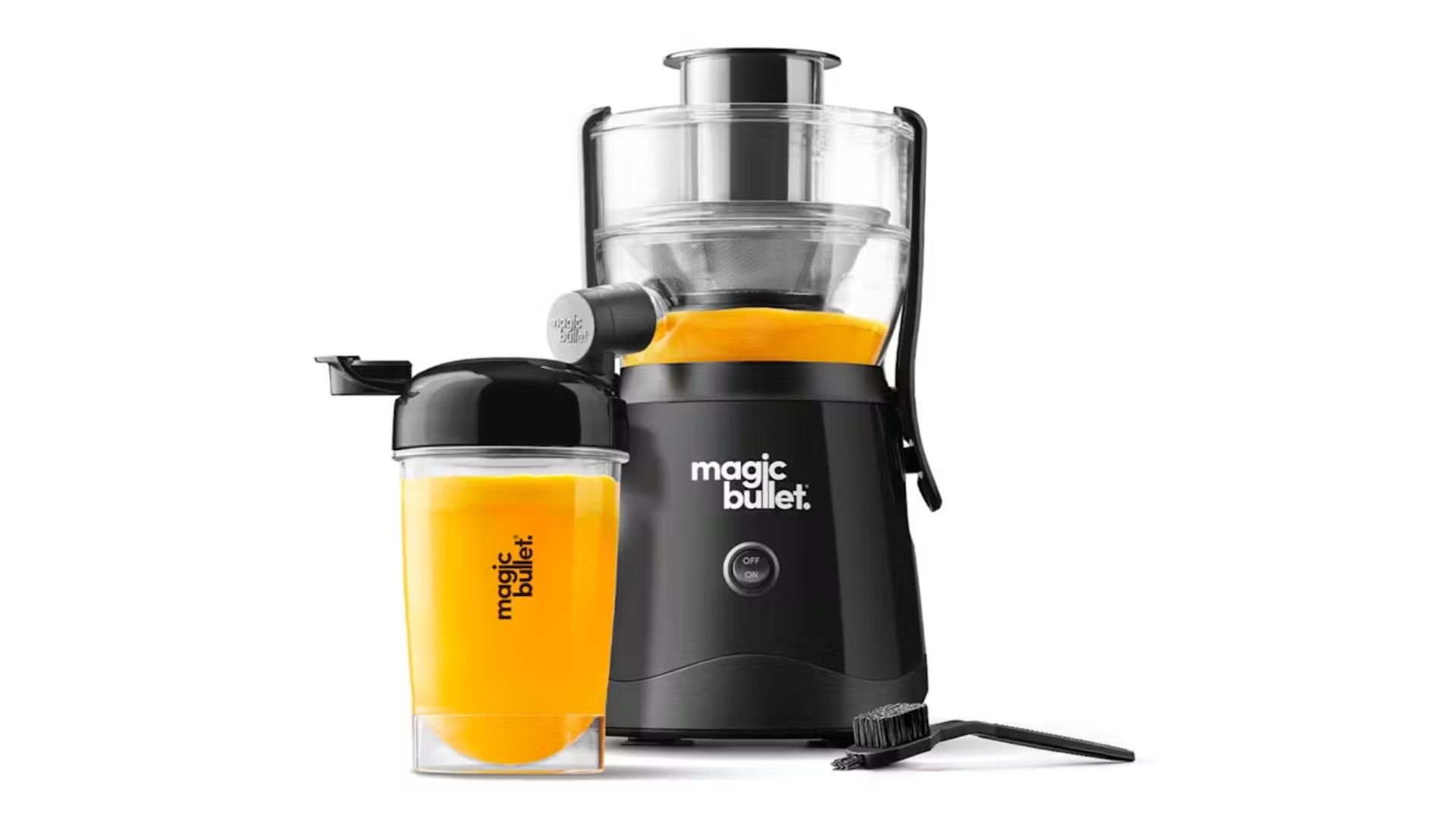
| Type: | Centrifugal |
| Weight: | 7.5lbs |
| Material: | Plastic |
| Speeds: | One |
| Watts: | 400 |
| Dimensions: | 7" x 6" x 11.5" |
| Cleaning: | Dishwasher safe; cleaning brush included |
Unboxing
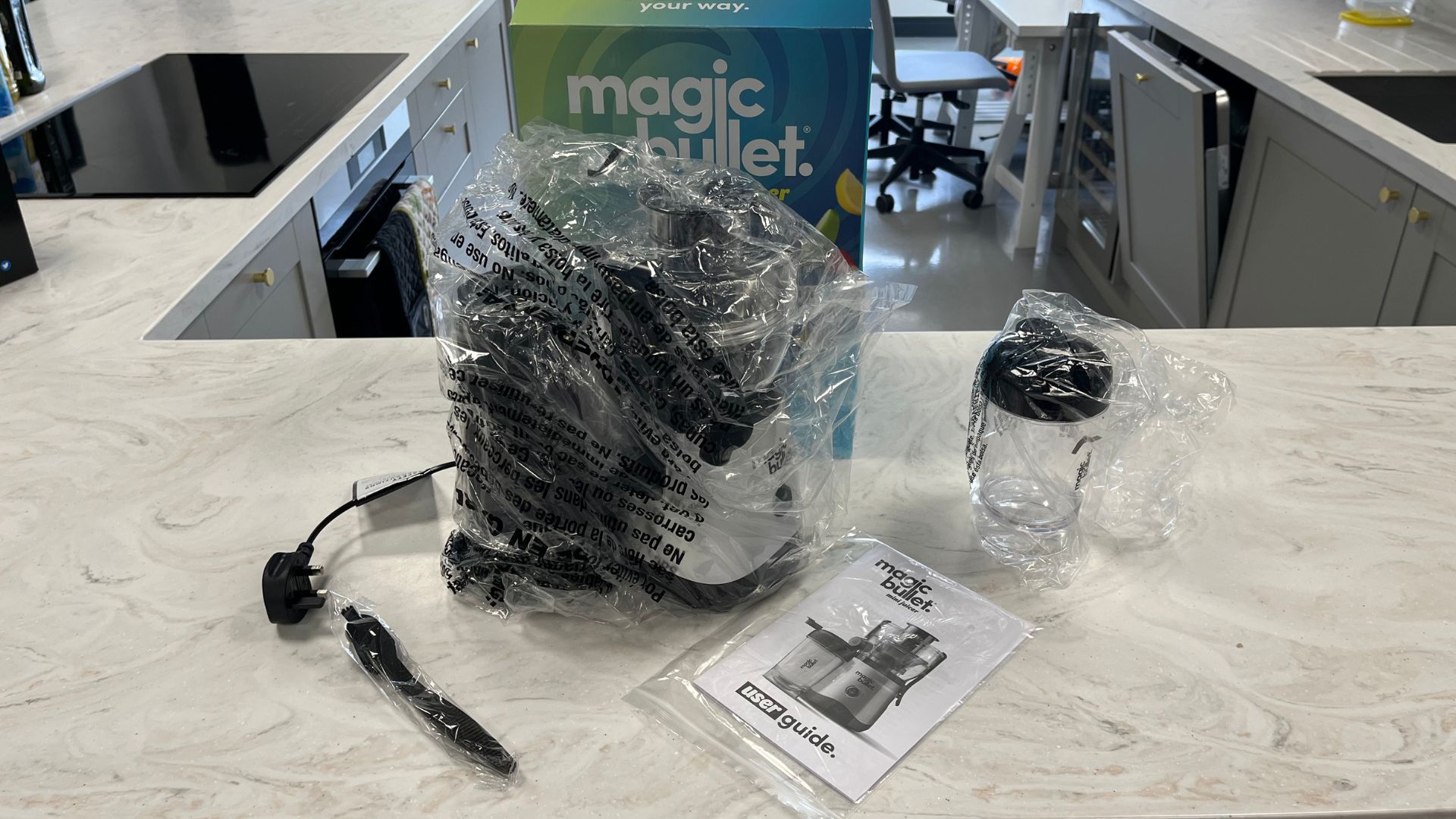
This was easy to unpack as there aren't many extraneous parts - the only thing you can't store in the juicer itself is the included 16-oz juice cup. However, every part was wrapped in plastic bags, which we never like to see. The cup is 16oz , which is less than a pint, and half of what some of the other juicers we’ve tested can hold. The pulp bin is also enormous, which didn't bode well for efficiency. It also comes with a brush for cleaning.
The instructions are simple and clear, with both diagrams and text. Everything fits together quickly, and I love the locking arms on either side to keep the bowl steady and the suction-cup feet. The pulp bin is a little fiddly to add at the back but not too bad. The nozzle is really low-tech - others have a tap which can open and close, but this is just a silicone spout, so if you make more than the cup can take, you can’t stop the flow of juice.
Test 1: Green juice
I always like to test a leafy green juice of apple, cucumber, spinach and kale. It's a health food classic, and a good measure of the juicer's performance on a wide range of fruits. Apple and cucumber show if a juicer can handle tough skins, and spinach and kale measure if it can extract juice from leaves, which can be tough for some juicers.
With the Magic Bullet Mini, you don’t have to peel most fruits, which I was excited to test, but you also have to add fruit one-by-one, which is a mildly frustrating - on big masticating juicers you can add everything in at once. I was also a little skeptical of the single power mode.
Design expertise in your inbox – from inspiring decorating ideas and beautiful celebrity homes to practical gardening advice and shopping round-ups.
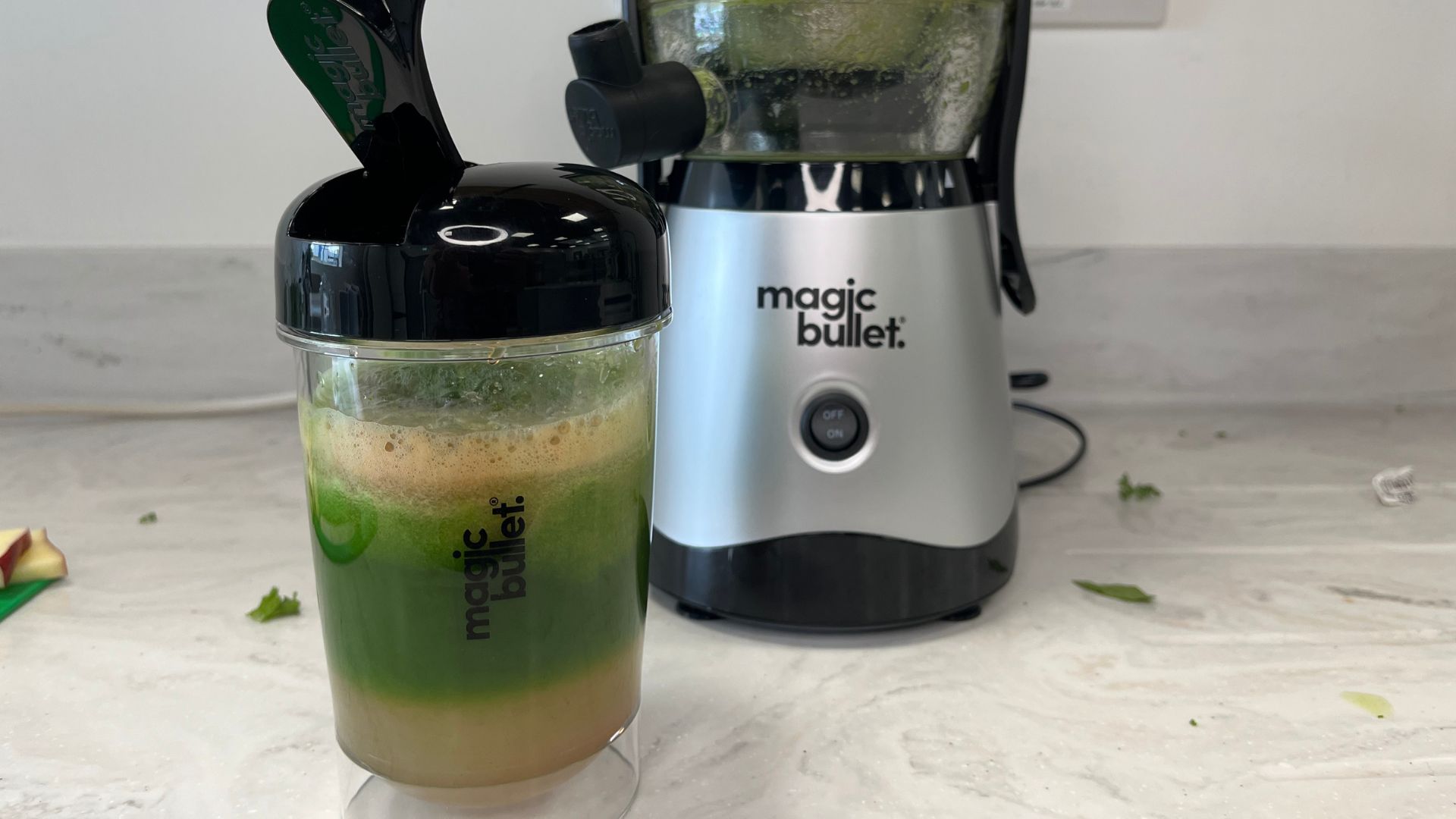
This juicer is incredibly loud. Juicing is never a relaxing sound, but this one sounds like a plane taking off, setting off the decibel meter on my smart watch. My worries about adding fruit one by one were proved true - it meant that meant layers of different types of juice were all sitting on top of each other as I added the different ingredients. You can see above that this looks pretty in the jug, and you can just shake it to mix them up, but you don't have to do it all with big juicers.
More importantly, adding ingredients one-by-one made it tricky to add kale and spinach, which you have to crush in your hand before feeding in. It was unnecessarily messy, which you can also see in the image above. However, this juicer easily went through half a cucumber in less than three seconds, which was really impressive.
When it came to the taste test, this was pretty good. It was smooth, fresh, and light, but overpowered by cucumber. There was also lots of foam produced, both from the juicer and because I had to shake up the juice to taste.
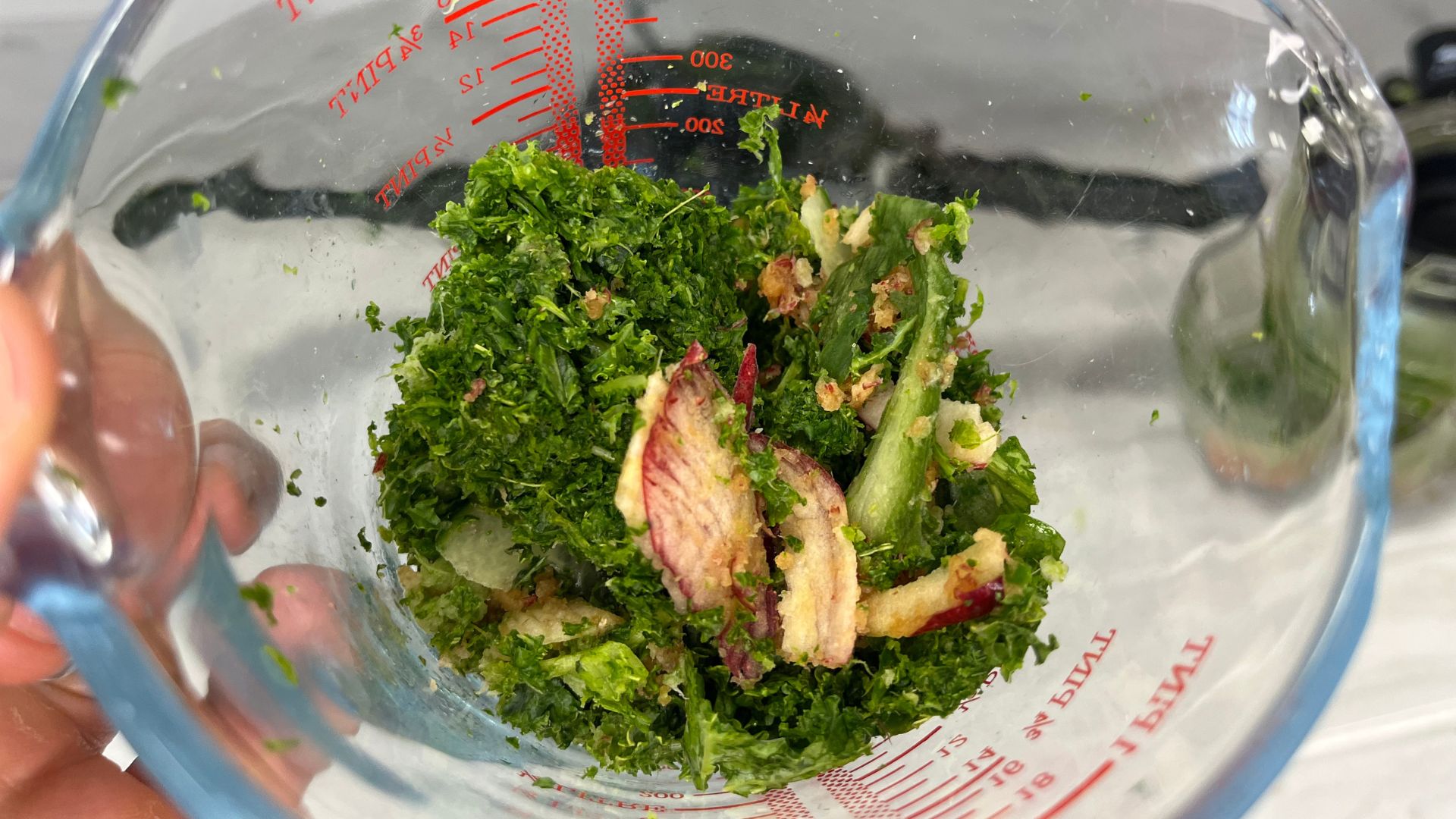
Opening up the pulp bin, you can see why - kale and spinach were barely touched by this one, with half a pint of left over spinach pulp. Not efficient for less than a pint of juice. The website says that this can handle skins on soft fruits, but apples were too hard for this, with some skins showing up in the pulp. In short, it's not good for leafy juices, and could be better at tackling skins.
Test 2: Orange juice
I truly believe there are few things in the world as good as a glass of fresh orange juice. What's more, it's a really useful test of a juicer, because citrus fruits can be surprisingly tricky. Though full of juice, there's lots of pith, pulp and that can make their way into the final juice.
My orange juice took four oranges, peeled and quartered, which took up a fair amount of time - it's not a juice for someone dashing out the door to work. It was pretty messy picking up the wet segments of orange to add to the juicer, and need a fair amount of cleaning up afterwards.
The juicer had no issue working through all of the oranges, and I filled the 16oz jug almost exactly, just under a pint of orange juice. It feels a little wasteful, but this is more a function of orange juice than inefficiency on the part of the juicer. There was about a 1/4 pint of pulp leftover, which is about average for a juicer.
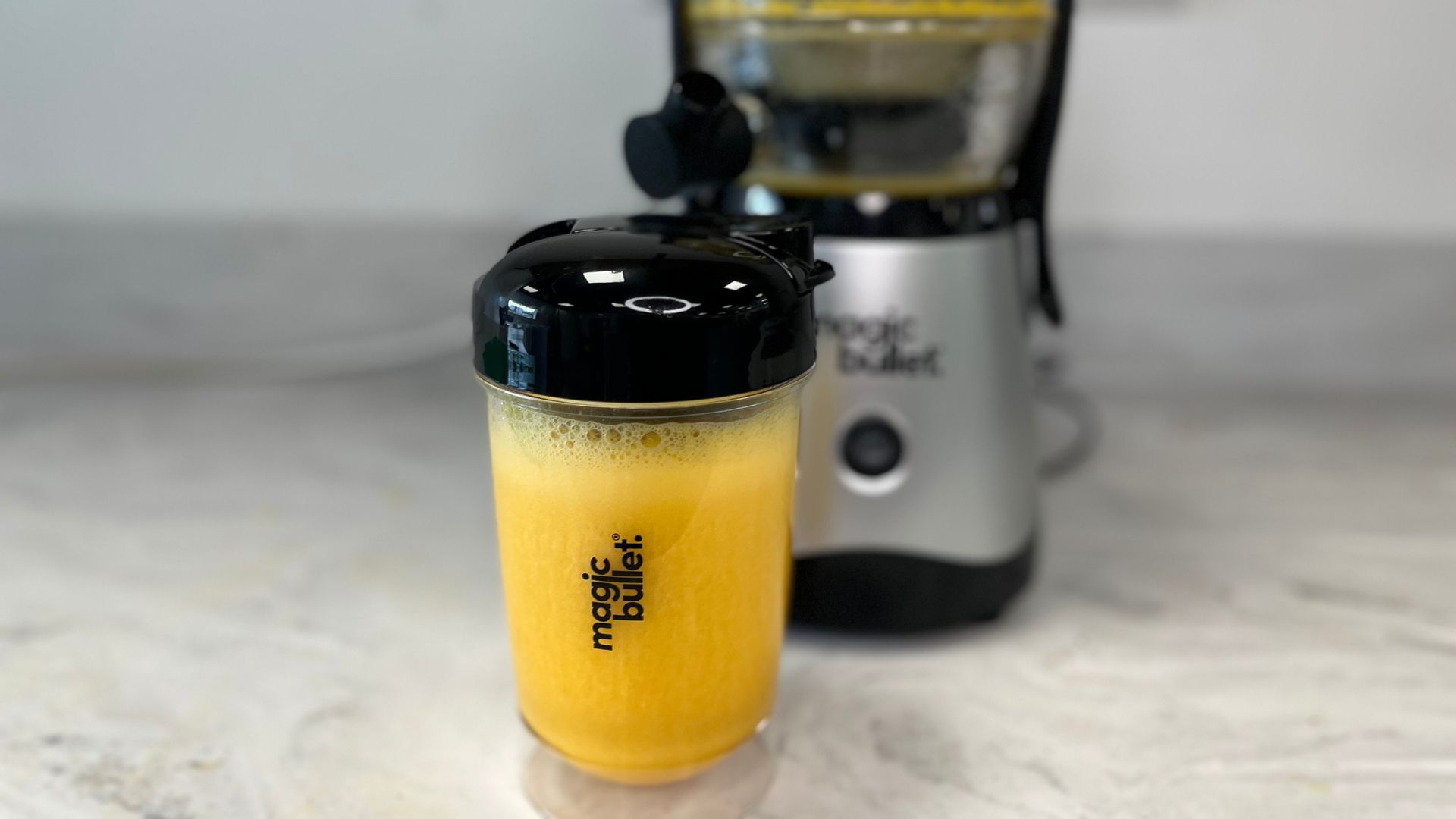
You can see above that the resulting juice was incredibly foamy, and I'm not even sure it could be classed as juice. That's not to say it was bad - it tasted incredibly good, smooth and sweet, but the mouthfeel was more like a smoothie or even a sorbet than a juice. If you scoop the foam or strain it, you get a thinner, juicier drink, but you shouldn't have to do this.
I also noticed something minor but annoying with the juicer jug. It’s pretty handy for taking to work or the gym, but the spout of it is right underneath where the lid lifts up. It's pretty easy to bump the lid into your forehead, which isn't great if there’s a leftover drop of juice in it.
Test 3 - Berries
Here, we usually test some frozen berries. These are cheaper and more common than fresh berries for juice, and you can also use them to make sorbets and toppings for açai bowls and overnight oats. The skins can also be tricky.
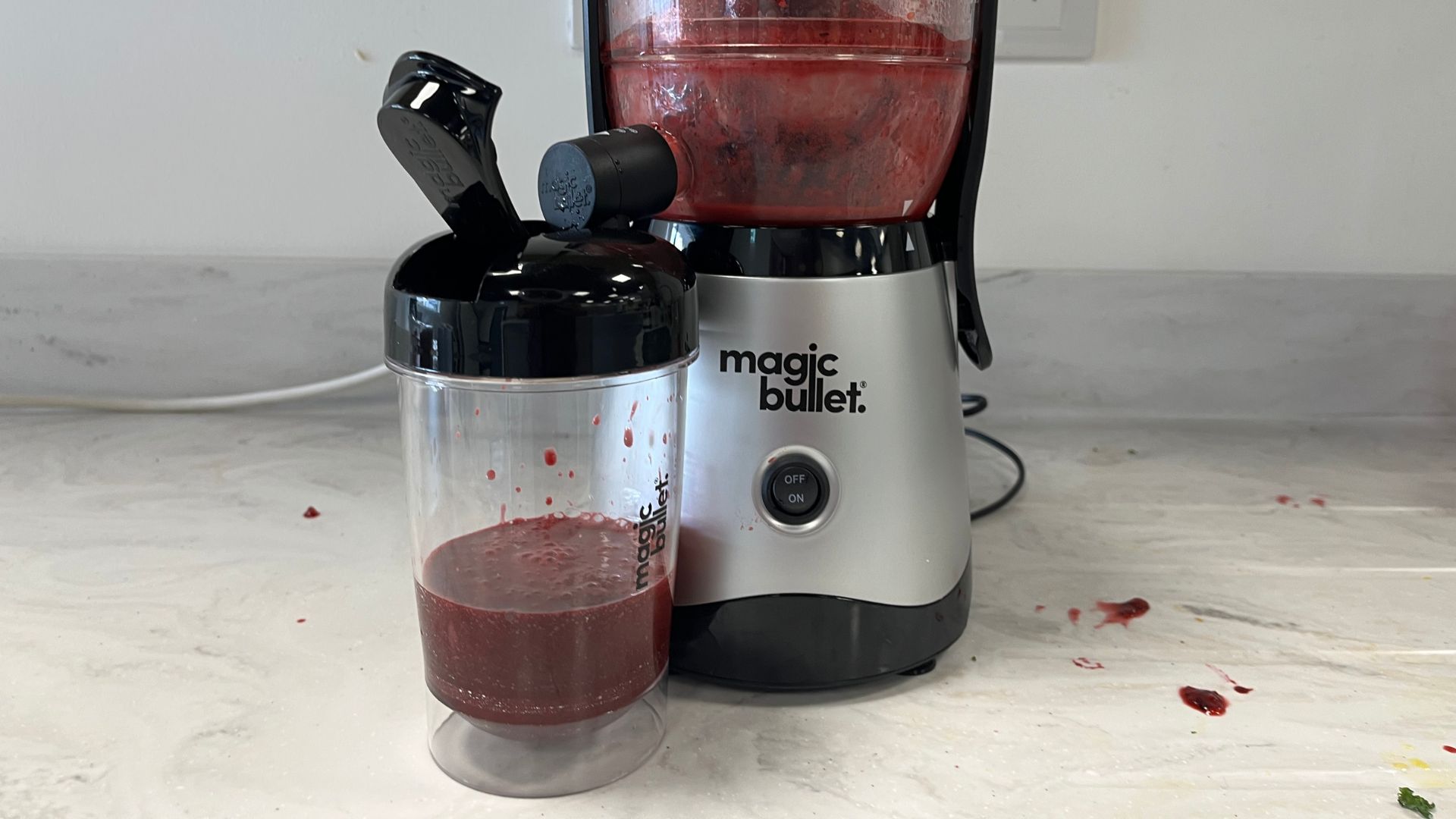
However, when I opened the manual I found that this juicer can't handle frozen fruit, which is unfortunate if you tend to buy frozen. Luckily, I had some blueberries and raspberries on hand, which I used to make a delicious berry juice. As with the other juices, it was perhaps a little thick, but overall it was very smooth with no pips. It was a delicious, healthy juice that you could freeze for popsicles for kids.
Cleaning
All the parts of this juicer are dishwasher safe, which is excellent. It's one of the sticking points of expensive juicers that they have to be cleaned by hand. If you don't have a dishwasher, there's a brush included that's really effective for cleaning pulp and pith out of the sieve and blade. It's a bit of a long clean up, but it's much faster than other juicers because there are fewer parts with fewer nooks and crannies where pith and pulp can hide.
How does it compare?
There are much better juicers out there, but not for the price. We've also tested the Nutribullet Juicer, from the same parent brand, and it's simply a better juicer. The Nutribullet has plenty of accessories, like a freezing tray, a froth separator, two glass to-go bottles, and a recipe book. It's also much faster, as it has more than double the power, and makes better juice. It's more than double the price, but the $160 MRRP is still hundreds of dollars cheaper than more expensive juicers.
Expensive juicers are even better. A Kuvings EVO820 can tackle whole fruits, as well as make sorbets, smoothies, and alternative milks. If you don't have $600 to spend on a juicer, you can get by with this Magic Bullet Mini, but you'll miss out on quality juice and extra functions.
However, a big problem with juicers is that they take up too much room. This juicer is half the height of the Kuvings or the Nama J2, so it's a much better option for small kitchens.
How does it rate online?
Reviews balance out to around four stars on average. Some find it difficult with leafy ingredients like wheatgrass. Others note the noise. However, plenty of people are really happy with this appliance for simple juices like apple and orange, and love how easy it is to store.
Should you buy it?
Yes, but only if budget is tight. If your family is having a bit of a juicing fad and you don't want to overspend on an appliance that you might not use in few months, this is a relatively cheap way to get into juicing without spending hundreds of dollars. It would make a good gift for teens or college students and is best suited to small apartment kitchens.
If you've set aside a few hundred dollars for a juicer, then steer clear. There are much better juicers out there. A premium masticating juicer makes much better juice, and has extra functions over a cheap centrifugal. They can handle trickier ingredients like leaves and ginger that this juicer can't handle.

As a gardens and lifestyle contributor, Alex makes sure readers find the right information to help them make the best purchase. Alex got his start in reviewing at the iconic Good Housekeeping Institute, testing a wide range of household products and appliances. He then moved to BBC Gardeners’ World Magazine, assessing gardening tools, machinery, and wildlife products.